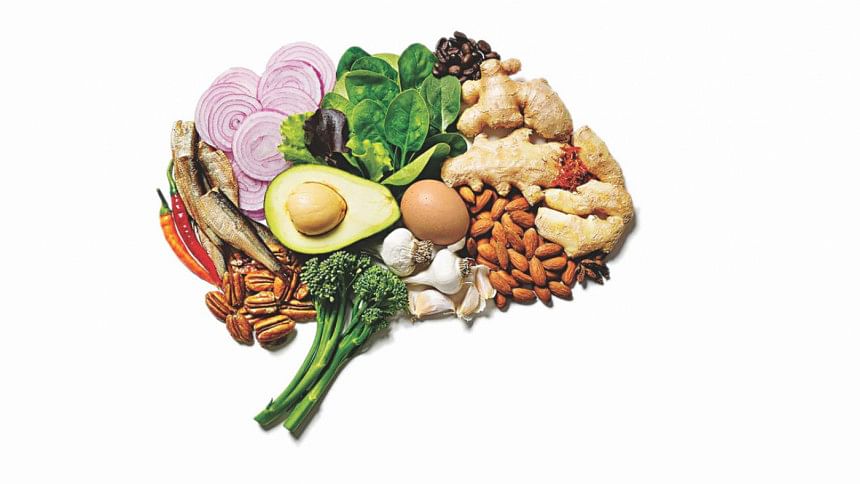Food for the brain

The foods you eat play a role in keeping your brain healthy and can improve specific mental tasks, such as memory and concentration. Your food choices may be the most influential variable you can control that relates to the health, vitality, and functionality of your precious brain. We are all at risk for brain degeneration — statistics show that if you live to the age of 85 or older, your risk for Alzheimer's rises to 50 percent.
EXTRA VIRGIN OLIVE OIL
This is truly a brain food. The powerful antioxidants known as polyphenols that are found in the oil, including EVOO in your diet may not only improve learning and memory, but also reverse the age- and disease-related changes. The oil also helps fight against ADDLs, proteins that are toxic to the brain and induce Alzheimer's.
FATTY FISH
When people talk about brain food, fatty fish is often at the top of the list. About 60 percent of your brain is made of fat, and half of that fat is the omega-3. Your brain uses omega-3s to build brain and nerve cells, and these fats are essential for learning and retention.
Research shows, people who ate baked or broiled fish regularly had more gray matter in their brains. Gray matter contains most of the nerve cells that control decision making process, memory, and emotion.
COFFEE
Two main components in coffee— caffeine and antioxidants— help your brain.
Increased alertness: Caffeine keeps your brain alert by blocking adenosine, a chemical messenger that makes you sleepy.
Improved mood: Caffeine may also boost some of your 'feel-good' neurotransmitters, such as serotonin.
Sharpened concentration: One study found that when participants drank one large coffee in the morning or smaller amounts throughout the day, they were more effective at tasks that required concentration.
BLUEBERRIES
Blueberries and other deep coloured berries deliver anthocyanins, a group of plant compounds with anti-inflammatory and antioxidant effects. Some of the antioxidants in blueberries have been found to accumulate in the brain and help improve communication between brain cells. Blueberries help improve memory and may even delay short-term memory loss.
TURMERIC
Curcumin, the active ingredient in turmeric, has been shown to cross the blood-brain barrier, meaning it can directly enter the brain and benefit the cells there.
May benefit memory: Curcumin may help improve memory in people with Alzheimer's. It may also help clear the amyloid plaques that are characteristics of this disease.
Eases depression: It boosts serotonin and dopamine, which both improve mood. One study found curcumin improved depression symptoms just as much as an antidepressant over six weeks.
Helps new brain cells grow: Curcumin boosts brain-derived neurotrophic factor, a type of growth hormone that helps brain cells grow. It may help delay age-related mental decline, but more research is needed.
BROCCOLI
The deep green vegetable is very high in vitamin K, delivering more than 100 percent of the Recommended Daily Intake (RDI) in a 1-cup (91g) serving.
This fat-soluble vitamin is essential for forming sphingolipids, a type of fat that's densely packed into brain cells. Broccoli contains a number of compounds, including vitamin K, that have powerful antioxidants and anti-inflammatory effects.
PUMPKIN SEEDS
They're also an excellent source of magnesium, iron, zinc and copper.
Zinc: This element is crucial for nerve signalling. Zinc deficiency has been linked to many neurological conditions, including Alzheimer's disease, depression and Parkinson's disease.
Magnesium: Magnesium is essential for learning and memory. Low magnesium levels are linked to many neurological diseases, including migraines, depression and epilepsy.
Copper: Your brain uses copper to help control nerve signals. And when copper levels are out of whack, there's a higher risk of neurodegenerative disorders, such as Alzheimer's.
Iron: Iron deficiency is often characterised by brain fog and impaired brain function.
Pumpkin seeds are rich in many micronutrients that are important for brain function, including copper, iron, magnesium and zinc.
DARK CHOCOLATE
The flavonoids in chocolate gather in the areas of the brain that deal with learning and memory. Researchers say these compounds may enhance memory and also help slow down age-related mental decline.
Those who ate chocolate more frequently performed better in a series of mental tasks, including some involving memory, than those who rarely ate it.
Chocolate is also a legitimate mood booster, endorsed by research.
NUTS
Nuts can improve cognition and even help prevent neurodegenerative diseases. Based on research it can be said that women who ate nuts regularly over the course of several years had a sharper memory, compared to those who did not eat nuts. Several nutrients, such as healthy fats, antioxidants and vitamin E, may explain their brain-health benefits.
Vitamin E shields cell membranes from free radical damage, helping slow mental decline. While all nuts are good for your brain, walnuts may have an extra edge, as they also deliver omega-3 fatty acids.
ORANGES
Citrusy oranges pack a tonne of vitamin C, which is a key factor in preventing mental decline, and thus is important for brain health.
Eating sufficient amounts of vitamin C- rich foods can protect against age-related mental decline and Alzheimer's disease.
Oranges and other foods that are high in vitamin C can help defend your brain against damage from free radicals.
EGGS
Choline is an important micronutrient that your body uses to create acetylcholine, a neurotransmitter that helps regulate mood and memory.
Higher intakes of choline were linked to better memory and mental function. Eating eggs is an easy way to get choline, given that egg yolks are among the most concentrated sources of this nutrient. Also, being deficient in two types of B vitamins —folate and B12— has been linked to depression. Eggs are a rich source of several B vitamins and choline, which are important for proper brain functioning and development, as well as regulating mood.
GREEN TEA
Green tea also has other components that make it a brain-healthy beverage. One of them is L-theanine, an amino acid that can cross the blood-brain barrier and increase the activity of the neurotransmitter GABA, which helps reduce anxiety and makes you feel more relaxed.
L-theanine also increases the frequency of alpha waves in the brain, which helps you relax without making you feel tired.
It's also rich in polyphenols and antioxidants that may protect the brain from mental decline and reduce the risk of Alzheimer's and Parkinson's
GREEN, LEAFY VEGETABLES
Green, leafy vegetables are also loaded with vitamins A and K (just one cup of kale has more than 684 percent of your recommended daily serving!) which help fight inflammation and keep bones strong.
A study evaluated the eating habits and mental ability of more than 950 older adults for an average of five years; those who ate a serving of leafy green veggies once or twice a day experienced slower mental deterioration than those who ate no vegetables, even when factors like age, education and family history of dementia were factored in.
AVOCADOS
This fruit is one of the healthiest that you can consume and one of my all-time favourites. While avocados often get a bad rep because of their high fat content, it's important to note that these green powerhouses are packed with monosaturated fats or the good kind, keeping blood sugar levels steady and your skin glowing.
Containing both vitamin K and folate, avocados help prevent blood clots in the brain (protecting against stroke) as well as help improve cognitive function, especially both memory and concentration.
Some foods, such as the fruits and vegetables in this list, as well as tea and coffee, have antioxidants that help protect your brain from damage.
Others, such as nuts and eggs, contain nutrients that support memory and brain development.
You can help support your brain health and boost your alertness, memory and mood by strategically including these foods in your diet.
Photo: Collected

 For all latest news, follow The Daily Star's Google News channel.
For all latest news, follow The Daily Star's Google News channel. 



Comments